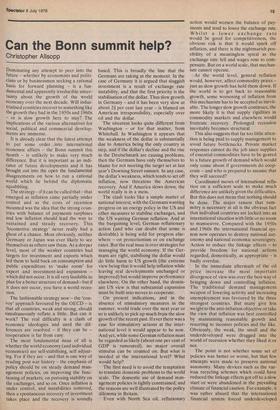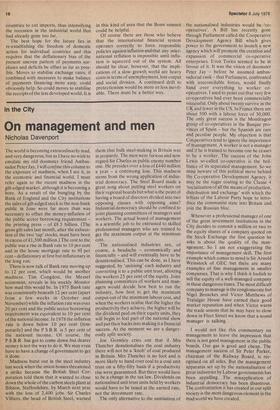Can the Bonn summit help?
Christopher Allsopp
Dominating any attempt to peer into the future — whether by economists and politicians or by businessmen seeking a rational basis for forward planning — is a fundamental and apparently irreducible uncertainty about the growth of the world economy over the next decade. Will industrialised countries recover to something like the growth they had in the 1950s and 1960s 7 or is slow growth here to stay? The implications of the various alternatives for social, political and commercial developments are immense.
It is already clear that the latest attempt to put some order into international economic affairs — the Bonn summit this month — is unlikely to make very much difference. But it is important as an indicator of future developments and it has brought out into the open the fundamental disagreements on how to run a rational world which lie behind the diplomatic Squabbling.
The strategy—if it can be called that —that emerged as inflation came partially under control and as the costs of recession mounted was the idea that the strong countries with balance of payments surpluses and low inflation should lead the way to sustained and steady recovery. This 'locomotive strategy' never really had a ghost of a chance. Most obviously, neither Germany or Japan was ever likely to see themselves as others saw them. At a deeper level, most of the weaker countries had targets for investment and exports which led them to hold back on consumption and public expenditure to 'make room' for export and investment-led expansion — which did not occur. It is all very laudable to plan for a better structure of demand—but if it does not occur, you have a world recession.
The fashionable strategy now — the 'convoy' approach favoured by the OECD — is that all countries, weak and strong, should simultaneously reflate a little. But can it work? The real difficulty is a clash of economic ideologies and until the differences are resolved — if they can be — cooperation is far from easy.
The most fundamental issue of all is whether the world economy (and individual economies) are self-stabilising, self adjusting. For if they are — and that is one way of reading post war history — the emphasis of policy should be on steady demand management policies, on improving the functioning of markets, on pursuing stability on the exchanges, and so on. Once inflation is under control, and instabilities removed, then a spontaneous recovery of investment takes place and the recovery is soundly based. This is broadly the line that the Germans are taking at the moment. In the case of Germany it is argued that sluggish investment is a result of exchange rate instability, and that the first priority is the stabilisation of the dollar. Thus slow growth in Germany — and it has been very slow at about 21 per cent last year — is blamed on American irresponsibility, especially over oil and the dollar.
The situation looks quite different from Washington — or for that matter, from Whitehall. In Washington it appears that the weakness of the dollar is substantially due to America being the only country in step, and if the dollar's decline and the rise in the Deutschmark are causing problems, then the Germans have only themselves to blame for not meeting the target set at last year's Downing Street summit. In any case, the dollar's weakness, which tends to set off inflation, now threatens the American recovery. And if America slows down, the world really is in a mess.
The clash looks like a simple matter of national interest, with the Germans wanting progress on an energy policy in the US and other measures to stabilise exchanges, and the US wanting German reflation. And at the bargaining level, German reflationary action (and who can doubt that some is desirable) is being sold for progress elsewhere — on protectionism or on exchange rates. But the real issue is over strategies for managing the world economy. If the Germans are right, stabilising the dollar would do little harm to US growth (the extreme view being that it would help inflation while leaving real developments unchanged or improved) but would improve performance elsewhere. On the other hand, the dominant US view is that substantial expansion must be built into moves to cooperate.
On present indications, and in the absence of stimulatory measures in the summer, world trade over the next year or so is unlikely to pick up much frqm the slow growth of the recent past. If ever there was a case for stimulatory actions at the international level it would appear to be now. And yet, while some German reflation must be regarded as likely (about one per cent of GDP is rumoured), no major overall stimulus can be counted on. But what is needed at the international level? What would help?
The first need is to avoid the temptation to translate domestic problems to the world scale. The domestic use of demand management policies is tightly constrained, and the reasons are well illustrated by the policy dilemma in Britain.
Even with North Sea oil, reflationary
action would worsen the balance of payments and tend to lower the exchange rate. Whilst a lower exchange rate would be good for competitiveness, the obvious risk is that it would spark off inflation, and there is the nightmarish possibility of a meaningless spiral as the exchange rate fell and wages rose to compensate. But on a world scale, that mechanism cannot operate.
At the world level, general reflation would, however, affect commodity prices — just as slow growth has held them down. If the world is to get back to reasonable growth, some worsening of inflation from this mechanism has to be accepted as inevitable. The longer slow growth continues, the more likely it is that supply rigidities in commodity markets and elsewhere would frustrate recovery. Prolonged recession inevitably becomes structural.
This also suggests that far too little attention is being paid to supply management to avoid future bottlenecks. Private market responses cannot do the job since supplies of essential commodities have to be geared to a future growth of demand which would only come about if governments do cooperate — and who is prepared to assume that they will succeed?
Coordinated moves of international reflation on a sufficient scale to make much difference are unlikely given the difficulties. But this does not mean that nothing should be done. The major reason that summitry is necessary at all is the obvious fact that individual countries are locked into an international situation with little or no room to manoeuvre. Compared with the 1950s and 1960s the international financial system now operates to destroy national autonomy and national economic sovereignty. Action to reduce the linkage effects — to provide freedom for national actions regarded, domestically, as appropriate — is badly overdue.
In the immediate aftermath of the oil price increase the most important divergence of view was over the best way of bringing down and controlling inflation. The traditional demand management weapon of lowering activity and increasing unemployment was favoured by the three strongest countries. But many give less weight to the anti-inflation objective or take the view that inflation was best controlled by maintaining reasonable growth and resorting to incomes policies and the like. Obviously, the weak, the small and the underdeveloped were dragged into the world of recession whether they liked it or not.
The point is not whether some set of policies was better or worse, but that few attempts were made to preserve national autonomy. Many devices such as the various recycling schemes which could have reduced the linkage effects got off to a slow start or were abandoned in the prevailing climate of financial caution. For example, it was rather absurd that the international financial system forced underdeveloped countries to cut imports, thus intensifying the recession in the industrial world that had already gone too far.
The best hope for the future lies in re-establishing the freedom of domestic action for individual countries and this requires that the deflationary bias of the present uneven pattern of payments surpluses and deficits be offset as far as possible. Moves to stabilise exchange rates, if combined with measures to make balance of payments financing more easy, could obviously help. So could moves to stabilise the receipts of the less developed world. It is in this kind of area that the Bonn summit could be helpful.
Of course there are those who believe that the international financial system operates correctly to force responsible policies against inflation and that any international reflation is impossible until inflation is squeezed out of the system. All should be clear, however, that the implications of a slow growth, world are heavy costs in terms of unemployment, lost output and social division. A continued drift to protectionism would be more or less inevitable. There must be a better way.



































 Previous page
Previous page